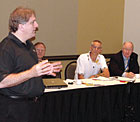
John Barba of Taco was one of several panelists who spoke about issues facing the oil heat trade today. Barba talked about meeting the growing demand for service technicians.
Oil-fired modulated condensing boiler - Pennsylvania contractor Dave Yates had a lot of praise for these boilers. He noted that the research and development team of equipment manufacturer Buderus had demonstrated its boiler at a recent ISH technology exposition in Germany. The boiler has gained momentum and popularity in Europe and will soon be available in the United States.
“It is very compact,” he said. “It can fit into a closet, which is important to many of the smaller homes in Europe. It is also very quiet.”
Yates added that a good selling point for the oil-fired modulated condensing boiler is its payback versus keeping an old boiler and leaving money in the bank.
“The consumer can enjoy a 28.5 percent return on investment using this high-efficiency boiler versus keeping their money in a certificate of deposit and earning far less in interest.”
Reducing hourly operational costs -Rich McNally of Watts Radiant talked about cutting costs per hour while still performing a professional installation.
“Saving on costs can be as simple as eliminating problems like finding out you have a wrong sized valve and going to different supply houses to find the right valve,” he said. “And the trip would probably include a stop at Dunkin’ Donuts. That extra cost can be enough to determine if you have made any money on a job.”
McNally suggested business owners look into “layering of time” where, instead of the “A” employees devoting 4-5 days on one job, they can spend less time on that job while making plans on another job.
McNally talked about using manufactured panels, which contain some of the key components in an HVAC system and can be prefabricated ahead of time. “These panels come from a single source and can be made in less time than it would take to assemble the components on the jobsite,” he said. “This would give a contractor’s ‘A’ people more time to work on other jobs.
“I see manufactured panels as the future of our industry.”
The need to increase the labor pool - John Barba of Taco talked about the need for technicians and how much the demand is growing. He quoted a U.S. Department of Labor statistic that showed the average job growth in the HVAC market increasing 7-13 percent through 2016.
Barba added, “The job prospects are considered excellent based on the jobs available and the number of people who apply for these jobs.”
He said that in the next six years there will be a 17 percent job growth in plumbing and a 29 percent job growth in HVAC. “What does that mean?” Barba asked. “It means we will need 700,000 new bodies by 2014.”
He said, “We need to make the funnel bigger” to attract more people to the trade, adding that it takes “all levels of the trade to promote, including trade associations, manufacturers, suppliers, and contractors.”
“Obviously you have to educate and pay these people in order to run your business profitably,” Barba said. “Your goal is not to have them go work for someone else or start their own business.”
Associations and the need to educate -Pennsylvania contractor Bob Boltz talked about the importance of trade associations and the ideas that come from the members. “If we don’t listen to our peers, our sandbox remains small,” he said.
Boltz noted this year is very critical for the oil heat industry because of the number of conversions from oil-burning equipment to other types of HVAC equipment, such as gas furnaces.
One member of the audience, a home inspector, said it was important for groups like NAOHSM to educate inspectors on the latest oil-fired equipment and noted that without similar education, homeowners will continue to convert to gas.
Boltz agreed but added, “Gas does not have much of an advantage. Too many homes have old oil heating equipment and there aren’t enough of the new high-efficiency oil heating equipment being installed.”
He said it is up to contractors to take charge of their own destinies, with the help of trade associations. “It is also up to us to make sure the trade association officers are doing their jobs - because they are working for us,” McNally said.
Publication date:06/16/2008

Report Abusive Comment